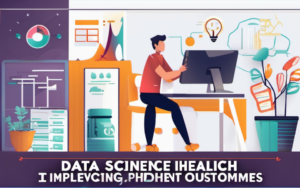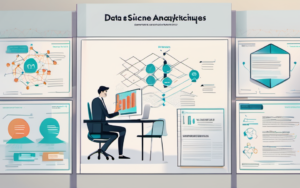Data science is no longer just a domain for tech giants and businesses. It’s emerging as a powerful tool for social change, unlocking a wealth of insights that can fuel positive change across various sectors. By harnessing the power of data, we can identify social problems, understand their root causes, and develop effective solutions to improve lives.
Data Science for Social Good: A Powerful Ally
Data science offers a unique perspective on social issues. It allows us to analyze vast amounts of data, identify patterns, and uncover hidden trends. This ability to extract meaningful insights from complex information is invaluable for addressing social challenges.
Harnessing Data for Impact
Imagine being able to identify communities most vulnerable to health disparities or pinpoint areas where educational resources are scarce. This is precisely the power of data science for social good. By analyzing demographic data, socioeconomic indicators, and other relevant factors, data scientists can provide crucial insights that inform decision-making and resource allocation.
The Intersection of Data Science and Social Change
The intersection of data science and social change is a dynamic space brimming with possibilities. By using data-driven approaches, we can develop targeted interventions, measure their impact, and continuously refine strategies for greater effectiveness. This iterative process ensures that social initiatives are not only effective but also sustainable in the long run.
Applications of Data Science in Social Impact
Data science is transforming the way we approach social challenges. It’s finding its way into a wide range of applications, from empowering communities to advocating for policy change.
Empowering Communities: Data-Driven Solutions for Social Issues
Data science is playing a pivotal role in addressing social issues at the community level. It’s being used to develop tailored solutions that meet the specific needs of different communities.
Healthcare and Public Health
From predicting disease outbreaks to optimizing healthcare resource allocation, data science is revolutionizing healthcare. By analyzing health records, demographic data, and environmental factors, data scientists can identify vulnerable populations, predict disease trends, and develop targeted interventions to improve public health outcomes.
Education and Inequality
Data science is helping us understand the complex factors contributing to educational inequalities. By analyzing student performance data, socioeconomic indicators, and access to resources, data scientists can pinpoint areas where interventions are needed most. This allows for the development of targeted programs and policies to ensure equitable access to quality education.
Environmental Sustainability
Data science is a powerful tool for tackling environmental challenges. By analyzing climate data, pollution levels, and resource consumption patterns, data scientists can identify environmental risks, develop sustainable solutions, and track their impact over time.
Advocacy and Policy: Data-Informed Decision Making
Data science is empowering social change advocates and policymakers with the evidence they need to drive impactful change. It provides the necessary data to support their claims, inform policy decisions, and hold institutions accountable.
Uncovering Social Injustices
Data science can help uncover hidden patterns of social injustice. By analyzing data on crime rates, unemployment rates, and other social indicators, data scientists can identify systemic inequalities and disparities that may not be visible at the surface level. This data can be used to advocate for policy changes to address these issues.
Influencing Policy and Legislation
Data science can provide policymakers with data-driven insights to inform their decisions. By analyzing the impact of different policies, identifying areas where interventions are needed, and measuring the effectiveness of existing programs, data scientists can contribute to evidence-based policymaking that leads to better outcomes for communities.
Challenges and Opportunities in Data Science for Social Change
While data science offers immense potential for social change, it’s not without its challenges. Addressing these challenges is crucial for ensuring responsible and equitable use of data science for social good.
Ethical Considerations and Data Privacy
One of the most critical aspects of using data science for social change is ensuring ethical data practices. We need to be mindful of data privacy and security, ensuring that data is used responsibly and ethically. This involves obtaining informed consent, anonymizing data where necessary, and protecting sensitive information.
Accessibility and Inclusivity in Data Science
Another crucial challenge is ensuring accessibility and inclusivity in data science. We need to ensure that marginalized communities have equal access to data science resources and opportunities. This includes providing training and education, developing culturally relevant data sets, and promoting diversity in the field.
Building Trust and Collaboration
Building trust and collaboration between data scientists, social impact organizations, and communities is essential for successful social change initiatives. This involves open communication, transparency in data collection and analysis, and ensuring that data-driven solutions are aligned with the needs and priorities of the communities they are intended to serve.
The Future of Data Science for Social Impact
The future of data science for social impact is bright, with emerging technologies and a growing awareness of the potential for data-driven change.
Emerging Technologies and Their Potential
Advances in artificial intelligence (AI), machine learning, and natural language processing are opening up new possibilities for social good. AI-powered tools can be used to identify patterns in complex data, predict social trends, and develop personalized interventions. These technologies have the potential to significantly enhance the effectiveness of social initiatives.
Cultivating a Data-Driven Culture of Change
As data science becomes more widely adopted in social impact work, it’s crucial to cultivate a data-driven culture of change. This involves educating stakeholders about the potential of data science, building capacity within social impact organizations, and fostering collaborations between data scientists and practitioners.
The Role of Data Scientists in Social Impact Organizations
Data scientists are playing an increasingly important role in social impact organizations. They are not only providing technical expertise but also acting as collaborators, advocates, and changemakers. As data science becomes more integrated into social impact work, the role of data scientists will continue to evolve, becoming even more crucial in driving positive change.
The Power of Insight for a Better World
Data science is not just a tool for analysis; it’s a catalyst for positive change. By harnessing the power of data, we can unlock new possibilities for addressing social challenges, empowering communities, and creating a more equitable and sustainable world.
A Call to Action: Embracing Data Science for Social Good
The potential of data science for social good is undeniable. It’s time for individuals, organizations, and governments to embrace data-driven approaches to social change. By investing in data science education, promoting ethical data practices, and fostering collaborations between data scientists and social impact organizations, we can unlock the full potential of data science to create a better future for all.




